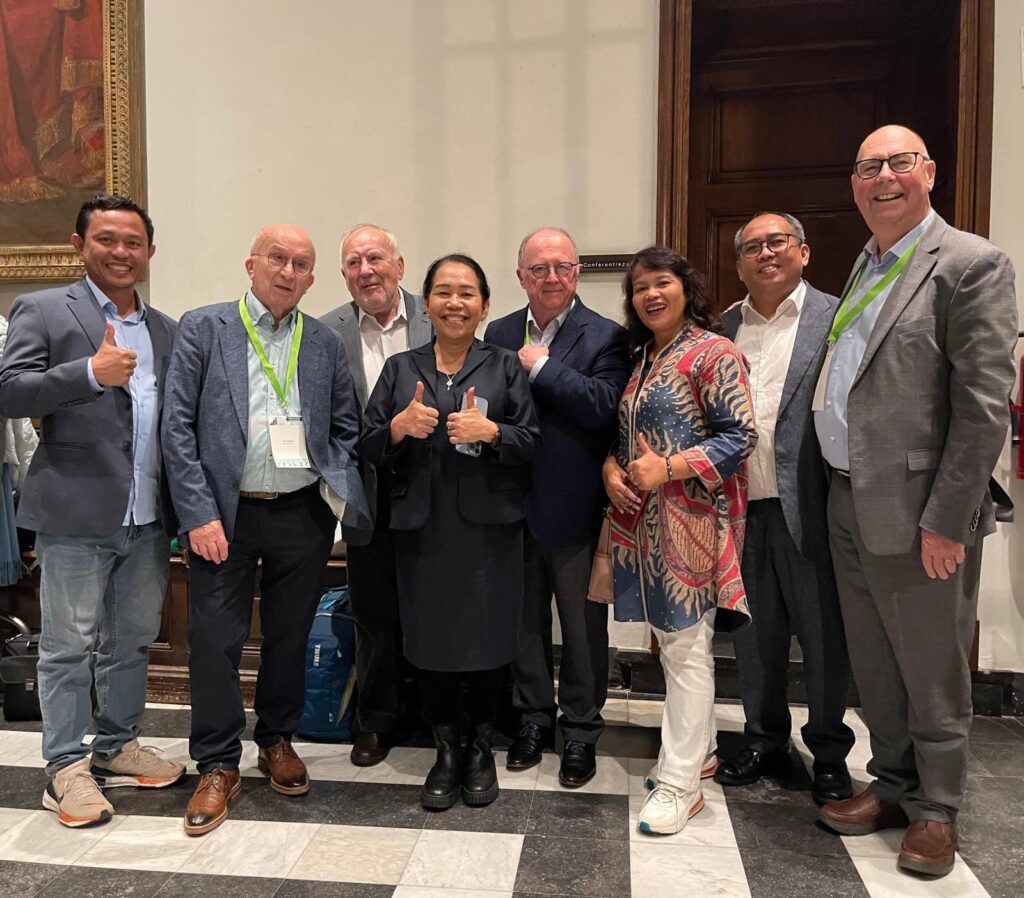Report from ACV Congress
14 to 18 October 2024
The national congress of ACV, the biggest trade union in Belgium attended by 1000 congress attendees, over 25 speakers and witnesses from home and abroad, engaging discussions, impactful resolutions on current issues: the national congress of October 17 and 18 can be called a success.
As the series of the congress especially as the existence in the international movement, ACV invited 52 participants from 12 countries of partners all over the world gathered in 2 days international seminar, held in Corsendonk-Duinse Polders at the region of Brugge . The seminar is to elaborate the progress of international program 2022 to 2026 while also slightly to prepare the new frame of program post 2026. The implementation of program in countries partners in Asia, Afrika and Latin America supplemented by regional program in those 3 continents. Those having different activities but actually there is uniformity and distinct characteristics as the 5 years frame of program is focusing on Decent Work for All with a more specific key issues of workers rights, gender mainstream, occupational safety and health including climate change and just transition and human right due diligence.
On specific way, ACV also conduct a colloquium focusing on the emerging issues nowadays about Digital platform work. 5 speakers from different continent speak about practicing the digital platform work in each country, the progress of people responses including regulation that are starting to be risen in some country. Its Elly Rosita from KSBSI Indonesia. Marthens from ACV Belgium, Gustavo from UGT Brazil, UGT Spain and from South Africa shared their experiences in the countries then audiences from various trade unions to response at divers point of view in order to strengthen t workers position in this economy. Maria Helene Andre from ILO ACTRAV also to speak about ILO process past 6 years that are going to a concrete initiative of ILO conference agenda 2025 and Monica Tepfer of ITUC explore about ITUC preparation the members affiliates based on their report .
The fantastic congress of ACV-CSC Belgium took place at Concert Hall Bruges

Arizona Campaign
Congress launches government formation campaign
In her closing speech, Chair Ann Vermorgen launched our campaign on the formation of the federal government. Because much is at stake in the coming weeks: will we have to work longer and harder? Will wages remain frozen for even longer? Will they tamper with the index? Will social security and public and collective services be stripped down?
The ACV (Christian Workers’ Union) wants to inform everyone well about the potential impact. That’s why we are distributing an Arizona newspaper via the affiliates and unions.
We list the 8 central demands that will remain a core part of our union’s response to the challenges regarding decent work, decent income, and a renewed economic and social system, regardless of any additions in further congress discussions.”
We also adhere to the 4G criteria:
• Gender equality (Gender test).
• Care for youth (Generational test).
• Attention to diversity and equality (Equality test).
• Contribution to the SDGs, the United Nations Sustainable Development Goals (SDG test).”
Resolutions of the congress:
- Sustainable peace and justice for all workers
- Worldwide Respect for Trade Union Rights
The Worldwide Rights Index of the International Trade Union Confederation (ITUC) shows a systematic deterioration of workers’ rights across the world. Globally, 22 trade unionists lost their lives due to their commitment to workers. Even in Europe and Belgium, workers and their organizations are increasingly being pressured and even directly threatened.
However, workers’ rights, trade unions, and democracy are inextricably linked. An attack on trade union rights is an attack on democracy itself. We want to express our support and solidarity to all defenders of workers’ rights worldwide. We demand that all governments worldwide comply with the fundamental conventions of the International Labour Organization (ILO) to protect workers and their organizations. Through all available avenues—from the ILO, ITUC, and international federations and partners—we will continue to pressure governments to respect these rights.
We also call on the Belgian and European authorities to put respect for trade union and workers’ rights back at the center of their policies, both in domestic policy and in trade agreements. - The Industry is Ours
The industry is under great pressure and is being affected by restructurings and bankruptcies, both in Belgium and across Europe. This concerns us because the industry is a vital pillar of our economy and essential for exports and investments. Moreover, the industry is crucial for the transition to a green economy. This transition is necessary and urgent, as the impact of climate change can no longer be ignored. There are no jobs on a dead planet.
Although workers had no say in the corporate and policy decisions that contributed to the current situation, they are bearing the consequences of the lack of vision and investment.
As ACV (Christian Workers’ Union), we call for the immediate implementation of a European and Belgian industrial plan that provides future prospects and sustainable local employment. Such a plan must be based on the participation and involvement of workers at all levels.
We demand that European and Belgian authorities provide a stable regulatory and investment framework for a future-oriented industry, one that can transition to a climate-neutral society and is adapted to the potential negative effects of the current transition. This means that workers must receive the necessary support, training, and guidance to prevent job losses and, in case of job loss, to regain future prospects - A Fair Policy is Needed
The government negotiations are still ongoing, but everything indicates that some parties want to use the budgetary path imposed on us by Europe to push through their ideological agenda, further attack civil society, and cut back on social achievements, collective services, public and non-profit sectors, and collective rights.
The ACV (Christian Workers’ Union) rejects this approach and demands a fair budget policy from the negotiators of the new government. A policy that focuses on tapping new sources of revenue from those who currently do not or barely contribute, and a policy that makes sure the strongest shoulders bear the heaviest burdens when efforts are needed, including through a wealth tax.
Workers have the right to a decent income, a sustainable career, security, and access to collective services, both public and non-profit. Basic conditions to achieve this include the abolition of the wage norm law, the preservation and expansion of the index, and a tax reform that ensures more fairness and justice.
The ACV will continue to confront the government negotiators with these crucial principles and will evaluate the outcomes of the negotiations against our program and memorandum. If necessary, we will advocate for adjustments—through dialogue when possible, through action if necessary!
Union impact grows from the bottom up, especially in the workplace, so ACV will systematically focus on informing, raising awareness, and mobilizing our members and potential members. Based on an ambitious action plan, preferably within a common trade union front, ACV will organize workers over the next four years around the following pillars: decent income, reliable collective services, public and non-profit sectors, strong social security, sufficient time for a quality life, and a livable future on our planet - Recognize Social Dialogue
Several signals from the ongoing federal negotiations point to a disregard for social dialogue and the importance of the collective rights built up over the years. At the regional level, social dialogue is not always respected either.
Social dialogue is the best guarantee for social peace and also leads to better outcomes for workers and the economy as a whole. It is based on a balance between the power of employers and the counterpower of collectively organized workers.
The ACV (Christian Workers’ Union) calls on the negotiators to recognize the importance of social dialogue and to ensure that social partners can continue to play their role freely and autonomously at all levels—whether in the private sector, public sector, or education.
This means that matters that belong to social dialogue, such as wages, flexibility, and retirement schemes, cannot be decided unilaterally by the government - Protect and Strengthen Collective Services, Public and Non-Profit Sectors
The budgetary choices will also be decisive for collective services, public and non-profit sectors, with the government negotiations seemingly leaning toward cuts rather than investments. Such cuts or lack of investment directly and severely affect workers, job seekers, young people, the elderly, and especially those who are vulnerable or financially struggling.
The ACV (Christian Workers’ Union) is convinced of the importance of collective services, public and non-profit sectors. Strong public and collective services are an essential pillar for ensuring a fair society, alongside a decent income and fair taxation. Collective services, public and non-profit sectors represent “collective wealth, and the only wealth of those who do not have individual wealth.”
The ACV believes that public and collective services guarantee respect for fundamental rights: the right to education, health, and well-being, as well as economic, political, social, and cultural rights.
The ACV calls on the government to recognize the importance of collective…
(It seems the text was cut off; feel free to provide the rest if you’d like me to translate further! - Against the Shift to the Right in Society
As ACV (Christian Workers’ Union), we observe with concern the growing number of voters who are seduced by the siren song of the far right and the increasing rightward shift in our society. This development threatens the democratic, just, and solidarity-based values that we seek to promote. However, due to the growing influence and normalization of the far right, these values are under pressure. The racist, discriminatory, and anti-union agenda of right-wing populist parties not only threatens acquired rights but also the fundamental principles of solidarity and inclusion upon which our democratic society is built.
The far right normalizes an ideology that is in stark contrast to the core values of the ACV. The rise of authoritarian and anti-democratic forces, both nationally and internationally, poses a direct threat to democracy. The success of the far right leads to a shift in policy and public opinion, where solidarity mechanisms are undermined, and discriminatory measures and language become normalized.
This calls for strong and coordinated action from the ACV to do everything possible to protect and strengthen our democratic values.
It is the task of the ACV to build a dam against the far right by strengthening cohesion, solidarity, and mutual understanding among workers. We do this primarily by continuing to fight for a socially just society. Addressing the sense of injustice felt by many workers is fundamental to reversing the growing rightward shift. We will also enhance our collaboration with like-minded organizations… - A Continuing Struggle for Equality Between Men and Women
The “trial balloons” floated during the federal government formation and in Brussels, as well as in the regional and community policy statements in the north and south of the country, give us great cause for concern. We observe a glaring lack of expertise and willingness to promote gender equality in our country. Everywhere the right makes progress, women’s rights regress.
The figures regarding the wage gap, the pension gap, differences in contracts, professional sectors, job intensity, modes of transport, family compositions (80% of single-parent families are “staffed” by women), the use of public and collective services, and the impact of work on health, all show time and again that the disparities between women and men are a reality. We also see this in our interactions with workers, both employed and unemployed.
That is why it is more urgent than ever that we join forces to combat these inequalities:
• Continue our historic struggle for higher gross wages and reduced working hours.
• Apply a gender lens—and systematically demand statistics on men and women.
For this reason, we will make March 8, International Women’s Day, a day of awareness and action. - Investing in Education is Investing in Everyone’s Future
The ACV (Christian Workers’ Union) recognizes that education as a public service plays a central role in our society. It provides opportunities for children and young people, shaping the workers, employers, and policymakers of the future. Investing in education thus contributes to the development of individual citizens and society as a whole.
To help build the future of our society, everyone must be able to rely on quality education, both in terms of solid general education and thorough vocational training. The well-educated learners of today are the strong citizens and workers of tomorrow. It is essential that education is organized democratically and is accessible to all, ensuring equal opportunities for all learners. Freedom of education and its organization must be safeguarded by the government.

The ACV emphasizes that this quality of education cannot be achieved without ensuring quality working conditions in education. Both have come under significant pressure in recent years across the country: declining educational outcomes, a severe teacher shortage, excessive workloads, rising absenteeism, and the uncertain future of status and pensions for educational staff. Moreover, social dialogue in the education sector no longer seems to be the place to collaboratively seek solutions to these challenges. These problems impose a heavy burden on the quality of education and the training of our future workforce.
*. Maria Emeninta-2024


